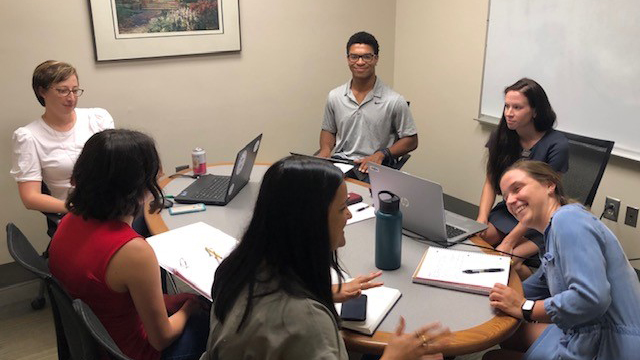Medical Legal Partnership finds solutions to family crises through collaboration
Sometimes, you know exactly where to go to solve a health problem. And sometimes it’s not so clear.
Imagine, for example, a patient whose asthma is exacerbated by the roaches infesting her apartment. Who can help best: a doctor to treat her asthma symptoms, or a lawyer to help make sure the conditions in her apartment are livable?
Meaningful solutions to many health problems require legal expertise, says Leslie Fisk, the managing attorney of the Greenwood office of South Carolina Legal Services.
“When clients are having problems, they don’t think, ‘Oh, this is a legal problem’ or ‘Oh, this must be a health problem,’” she says. “They’re just thinking, ‘There are roaches in my apartment, and I can’t handle this anymore.’”
The Medical Legal Partnership (MLP), celebrating its fifth anniversary this week, was established to help families address civil-legal problems that impact their health, such as moldy apartments, issues with benefits, elder care and more.

Counterclockwise from left: Kara Davis, evaluation coordinator for Furman’s Institute for the Advancement of Community Health, Rachel Riley ’23, Riya Misal ’22, Ellie Bisese a Master of Science Community Engaged Medicine student, Becky Warner, an MLP coordinator, and Jordan Childs, a MSCEM student, during an orientation to the MLP in 2021
The partnership between Furman University’s Institute for the Advancement of Community Health, Prisma Health and South Carolina Legal Services became official on Oct. 22, 2016, with the goal of working to improve health outcomes for low-income families throughout the Upstate.
Throughout those five years, the partnership — the first of its kind in South Carolina — has increased access to legal assistance for hundreds of patients whose medical problems have roots in or are made worse by a social or legal challenge.
In 2019, the MLP received a $1.025 million three-year grant from The Duke Endowment to engage in statewide collaboration with other Medical Legal Partnerships to determine best practices and achieve maximum impact.
This impact is evident in cases like Melanie Stiles’.
Stiles was one of the Upstate MLP’s first clients. Her son, Jacob Stiles, who has autism and other behavioral and mood disorders, got into legal trouble at age 17. But he turned 18 in jail – beyond the age where his parents could legally advocate for him.
At the time, the family’s Prisma Health pediatrician, Nancy Powers, was already in conversation with Kirby Mitchell ’90, a senior litigation attorney with South Carolina Legal Services, about forming an MLP. Jacob was just the impetus they needed to move forward. Today, however, all of cases the MLP takes on are civil in nature.
Mitchell, who became the MLP’s legal director, helped Melanie Stiles obtain guardianship and found a public defender to take the case.
“Jacob got his day in court,” she remembered, “and I had the opportunity to write a letter to the judge, just sharing from my heart that it would not do society well for him to be incarcerated for 45 years – but to put him in a situation to assist him in doing right, that would be much more beneficial. And at the end of the day, thankfully, the judge agreed.”
Jacob Stiles is now living on his own in transitional housing, and Melanie Stiles is still grateful for the help her family received.
“Our hands would have been tied if it wasn’t for the MLP,” she said.